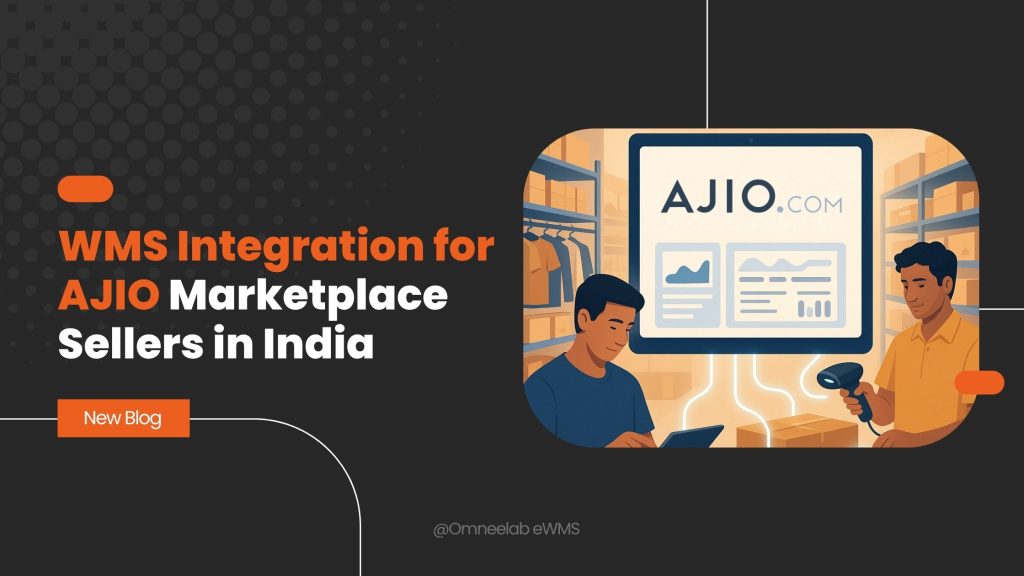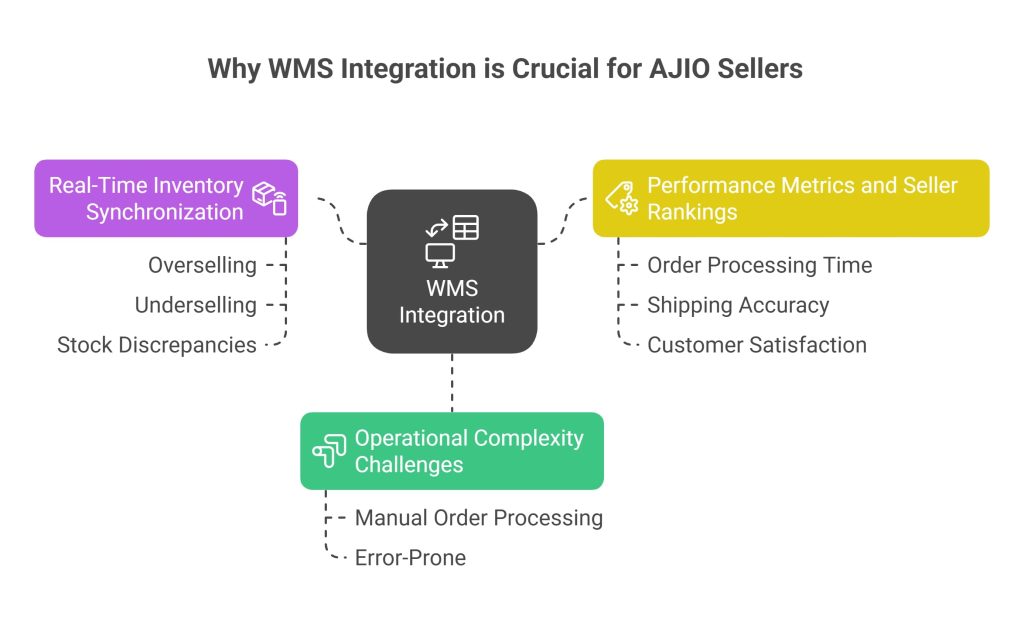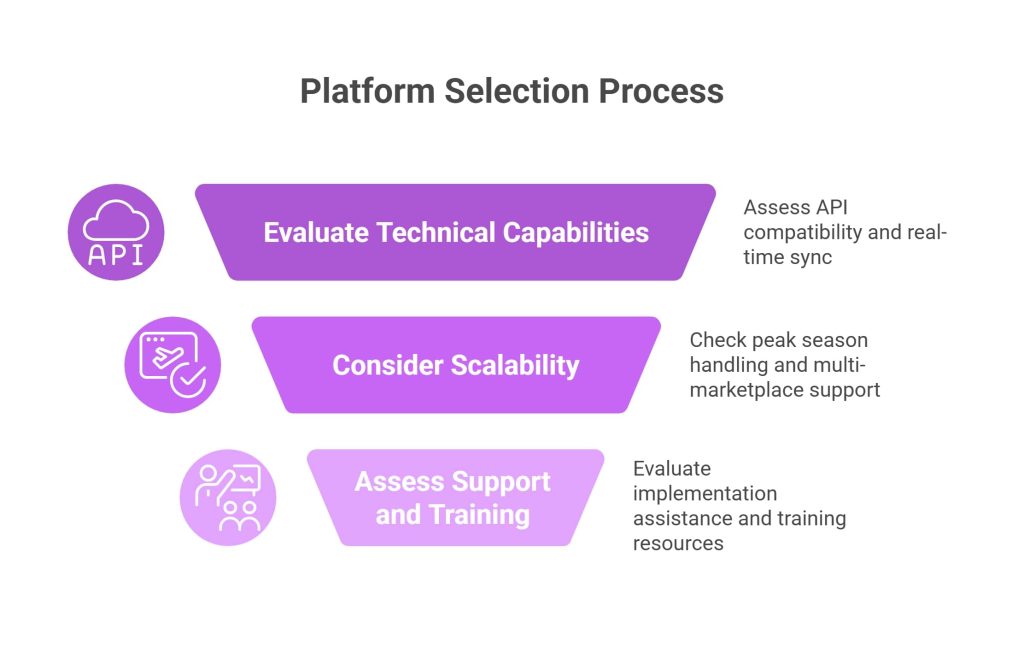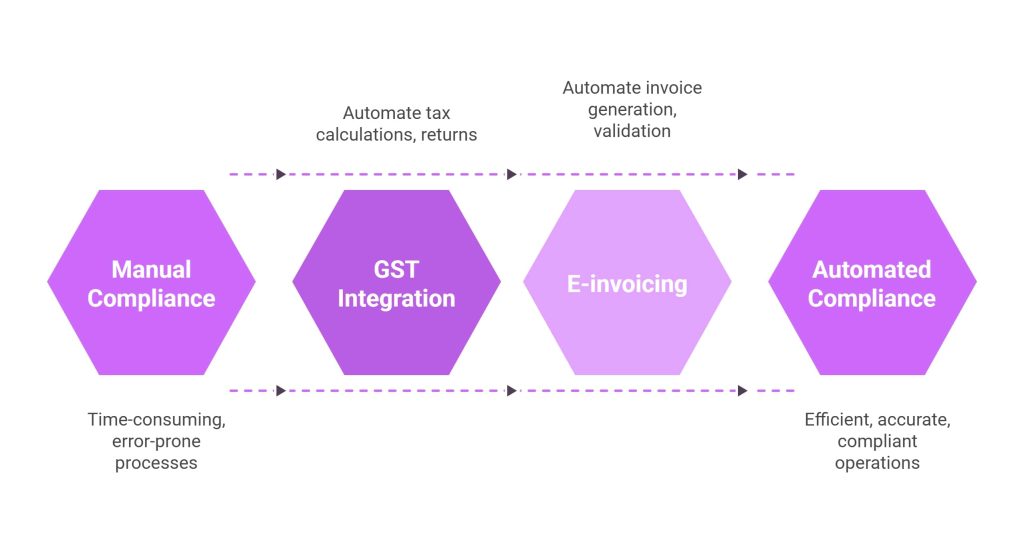Selling on AJIO marketplace in India can feel like juggling multiple balls at once – inventory tracking, order processing, shipment management, and customer satisfaction all demand your attention simultaneously. But what if there was a way to automate most of these processes and dramatically improve your operational efficiency?

Enter warehouse management system ajio sellers integration – a game-changing solution that’s transforming how Indian e-commerce businesses operate on one of the country’s fastest-growing fashion marketplaces. Whether you’re a small boutique or a large-scale retailer, understanding how to leverage wms integration for ajio marketplace sellers in india can be the difference between struggling with manual processes and scaling your business effortlessly.
In this comprehensive guide, we’ll explore everything you need to know about implementing a robust warehouse management system for your AJIO operations, from choosing the right platform to maximizing your return on investment.
Understanding AJIO Marketplace Sellers Ecosystem
AJIO, Reliance Retail’s fashion and lifestyle e-commerce platform, has rapidly emerged as a major player in India’s digital marketplace landscape. Unlike traditional B2C models, AJIO operates on a sophisticated B2B2C framework that requires sellers to maintain precise inventory control, rapid order processing, and seamless integration with multiple fulfillment channels.
The platform’s unique approach includes several distinct business models:
- Traditional marketplace selling where sellers manage their own inventory
- AJIO dropship model integration for vendors who prefer minimal inventory holding
- JIT (Just-in-Time) model warehouse management for optimized stock levels
- Bulk B2B orders through AJIO’s corporate sales channels
Each of these models presents specific challenges that a well-implemented ajio seller wms integration solutions can address effectively. Understanding the business need of warehouse management systems becomes crucial for sellers looking to scale their operations efficiently.
Why WMS Integration is Crucial for AJIO Sellers
Operational Complexity Challenges
Managing operations on AJIO without proper system integration is like trying to conduct an orchestra without a conductor. You might have talented musicians (efficient processes), but without coordination, the result is chaos rather than harmony.
Consider this scenario: You receive 50 orders in the morning, 30 more by afternoon, and another 25 by evening. Each order needs inventory verification, picking list generation, packaging according to AJIO’s specific guidelines, shipping label creation, and tracking updates. Without automated order processing ajio sellers capabilities, this becomes a manual nightmare prone to errors and delays.
Modern businesses are increasingly adopting automated inventory management to overcome these challenges and maintain competitive advantage.
Real-Time Inventory Synchronization
One of the most critical aspects of ajio marketplace warehouse management system integration is maintaining accurate inventory levels across all channels. When your WMS isn’t properly connected to AJIO’s seller portal, you risk:
- Overselling products that are out of stock
- Underselling items due to conservative inventory estimates
- Manual inventory updates that consume valuable time
- Stock discrepancies that affect seller performance metrics
A properly integrated system ensures real-time inventory tracking ajio across all your sales channels, preventing these costly mistakes.

A properly integrated system ensures real-time inventory tracking ajio across all your sales channels, preventing these costly mistakes. Learn more about inventory visibility in 2025 and how it’s shaping modern e-commerce operations.
Performance Metrics and Seller Rankings
AJIO, like other major marketplaces, evaluates sellers based on various performance indicators including order processing time, shipping accuracy, and customer satisfaction scores. Ajio seller performance optimization becomes significantly easier when you have automated systems handling routine tasks, allowing you to focus on strategic growth initiatives.
As e-commerce penetration deepens across India—projected to reach $120 billion by 2025—the pressure on last mile delivery stations to perform efficiently has never been greater. This is where integrated WMS last mile delivery stations solutions offer transformative potential.
Top WMS Solutions for AJIO Marketplace Integration
Favourite for All Seller Types
Omneelab Suite AJIO Integration
Omneelab WMS is fast becoming the favourite for AJIO marketplace sellers of every size and business model. Its flexible architecture, user-friendly interface, and powerful automation make it ideal for both new sellers and established enterprises. Key features include:
- Robust AJIO API integration and real-time order sync
- Highly customizable workflows for dropship, JIT, and B2B/B2C models
- Advanced inventory visibility across multiple channels
- Smart order routing, picking, and packing automation
- Comprehensive analytics dashboard for performance optimization
- Scalable cloud-based solution with excellent customer support
Whether you’re managing a small warehouse or a multi-node distribution network, Omneelab Suite seamlessly adapts to your needs—making it the go-to choice for diverse AJIO sellers.
Curious how OmneelabWMS can transform your AJIO operations? Book a free meeting with our experts today and get a personalized walkthrough tailored to your business needs!.
Enterprise-Level Solutions
Unicommerce AJIO Integration Unicommerce stands out as one of the most comprehensive wms software for ajio sellers india options available. Their platform offers:
- Native AJIO API connectivity
- Multi-channel inventory management
- Automated order routing and processing
- Advanced analytics and reporting capabilities
- Scalable pricing models suitable for businesses of all sizes
Vinculum AJIO Integration Vinculum’s Vin eRetail platform provides robust ajio marketplace fulfillment integration with features specifically designed for Indian e-commerce businesses:
- Real-time order synchronization
- Automated inventory updates
- Multi-location warehouse management
- Comprehensive returns processing
- GST and compliance automation
Mid-Market Solutions
EasyEcom AJIO Dropship Particularly strong for businesses operating on ajio dropship wms integration models, EasyEcom offers:
- Simplified vendor management
- Automated dropship order routing
- Real-time tracking updates
- Performance analytics and insights
Eshopbox AJIO Fulfillment Eshopbox provides an interesting hybrid approach, combining ajio seller central wms connection with fulfillment services:
- Integrated warehouse network
- Technology platform access
- Scalable fulfillment options
- Comprehensive seller support
Specialized Platforms
WareIQ AJIO Order Management WareIQ focuses on ajio order processing automation with particular strength in:
- Dark store network integration
- Last-mile delivery optimization
- Technology-enabled fulfillment
- Flexible pricing models
Increff AJIO Integration Increff offers AI-powered ajio marketplace order management solutions featuring:
- Predictive inventory planning
- Automated demand forecasting
- Advanced analytics capabilities
- Machine learning-driven optimization
Implementation Process: Step-by-Step Guide
Phase 1: Assessment and Planning
Before diving into ajio seller api integration, conduct a thorough assessment of your current operations. Ask yourself:
- What’s your average daily order volume?
- How many SKUs do you manage?
- What are your peak season requirements?
- Which business model(s) do you operate on AJIO?
This assessment helps determine the complexity level of marketplace integration software ajio you’ll need. For guidance on choosing the right warehouse management solution, consider factors like scalability, integration capabilities, and support quality.
Phase 2: Platform Selection and Setup
Choosing the right platform involves evaluating several factors:
Technical Capabilities
- API compatibility with AJIO’s systems
- Real-time synchronization capabilities
- Multi-location warehouse support
- Integration with existing tools (accounting, CRM, etc.)
Understanding top WMS integration types and benefits can help you make informed decisions about which integration approach suits your business best.
Scalability Considerations
- Ability to handle peak season volumes
- Multi-marketplace support for future expansion
- Flexible pricing models that grow with your business

Support and Training
- Implementation assistance
- Ongoing technical support
- Training resources for your team
Phase 3: Integration and Testing
The actual ajio seller portal integration process typically involves:
- API Configuration: Setting up secure connections between your WMS and AJIO’s seller portal
- Data Mapping: Ensuring product information, inventory levels, and order details sync correctly
- Workflow Setup: Configuring automated processes for order processing, inventory updates, and shipping
- Testing Phase: Running test orders through the system to identify and resolve any issues
Phase 4: Go-Live and Optimization
Once your ajio seller system connectivity is established, focus on:
- Monitoring system performance during initial weeks
- Training your team on new processes
- Gradually increasing automation levels
- Collecting feedback and making necessary adjustments
According to a Knight Frank report, Indian warehouses equipped with advanced WMS solutions achieve inventory accuracy rates of over 98%, compared to less than 70% with manual processes, highlighting the critical role of automation in e-commerce fulfillment.
Advanced Features and Capabilities
Multi-Channel Inventory Management
With nearly 60% of Indian online sellers now managing their catalogs across three or more marketplaces, seamless WMS integration has become essential for synchronized inventory, reduced stockouts, and improved seller ratings.
If you’re also selling on other platforms, consider exploring our guides for WMS for Myntra sellers, WMS for Shopify ecommerce fulfillment, or WMS for Meesho to understand platform-specific requirements.
Modern multi-channel inventory management ajio solutions go beyond simple stock tracking. They provide:Centralized Inventory Control
- Single dashboard for all sales channels
- Automated stock allocation across platforms
- Real-time availability updates
- Low stock alerts and reorder recommendations
Channel-Specific Optimization
- Platform-specific pricing strategies
- Customized product descriptions and images
- Channel performance analytics
- Automated promotional campaign management
Automated Compliance Management
Indian e-commerce regulations require careful attention to various compliance requirements. Advanced WMS solutions offer ajio seller compliance automation including:
GST Integration AJIO Sellers
- Automated tax calculations
- GST return preparation
- Invoice generation and management
- Compliance reporting and documentation

E-invoicing AJIO Marketplace
- Automated e-invoice generation
- Government portal integration
- Real-time validation and verification
- Error handling and correction workflows
Returns Management System
Ajio returns management system integration is crucial for maintaining seller performance metrics. Advanced features include:
- Automated return authorization
- Quality check workflows
- Refund processing automation
- Return analytics and insights
Recent surveys reveal that 80% of Indian online shoppers expect same-day or next-day delivery—making real-time WMS integration and automated order processing vital for AJIO sellers to stay competitive.
Industry-Specific Considerations
Fashion Inventory Management AJIO
Fashion and lifestyle products present unique challenges:
Seasonal Inventory Planning
- Trend-based demand forecasting
- Seasonal stock optimization
- Clearance sale automation
- New collection launch management
Size and Variant Management
- Complex SKU structures
- Size-wise inventory tracking
- Variant-specific pricing
- Color and style coordination
Lifestyle Product Fulfillment AJIO
Lifestyle products often require specialized handling:
Packaging Requirements
- Brand-specific packaging guidelines
- Fragile item handling protocols
- Gift wrapping automation
- Special delivery instructions
Quality Control Processes
- Pre-shipment quality checks
- Damage prevention protocols
- Customer satisfaction monitoring
- Return quality analysis
Cost-Benefit Analysis
Implementation Costs
Understanding the investment required for wms integration for ajio marketplace sellers in india helps in making informed decisions:
Setup Costs
- Platform licensing fees: ₹10,000 – ₹50,000 per month
- Implementation services: ₹25,000 – ₹1,00,000 one-time
- Training and onboarding: ₹5,000 – ₹20,000
- Customization requirements: Variable based on complexity
Ongoing Operational Costs
- Monthly subscription fees
- Transaction-based charges
- Support and maintenance
- Additional feature upgrades
Deloitte’s logistics outlook underscores that automated WMS systems can reduce returns processing time by up to 40%, directly improving seller performance metrics and customer satisfaction for online marketplaces like AJIO.
Return on Investment
The benefits of proper ajio seller inventory management integration typically include:
Operational Efficiency Gains
- 60-80% reduction in manual order processing time
- 90%+ accuracy in inventory synchronization
- 50% faster order fulfillment cycles
- Significant reduction in human errors
Revenue Impact
- Increased order processing capacity
- Improved seller performance ratings
- Higher customer satisfaction scores
- Reduced operational costs per order
Common Challenges and Solutions
Technical Integration Hurdles
API Limitations and Workarounds Sometimes AJIO’s API might not support all the features you need. Common solutions include:
- Using middleware platforms for enhanced connectivity
- Implementing custom API extensions
- Leveraging third-party integration tools
- Working with AJIO’s technical team for API enhancements
Data Synchronization Issues Maintaining data consistency across systems can be challenging:
- Implementing robust error handling mechanisms
- Setting up automated data validation processes
- Creating backup and recovery procedures
- Establishing monitoring and alert systems
Operational Adaptation Challenges
Team Training and Change Management Moving from manual to automated processes requires careful change management:
- Comprehensive training programs for all team members
- Gradual implementation to allow adaptation
- Clear documentation of new processes
- Regular feedback sessions and process improvements
Process Standardization Ensuring consistent operations across all channels:
- Developing standard operating procedures
- Implementing quality control checkpoints
- Creating performance monitoring dashboards
- Establishing continuous improvement processes
Future Trends and Innovations
AI and Machine Learning Integration
The future of ajio seller supply chain optimization lies in intelligent automation:
Predictive Analytics
- Demand forecasting based on historical data and market trends
- Automated reorder point calculations
- Seasonal planning optimization
- Customer behavior prediction
Intelligent Automation
- Smart order routing based on location and availability
- Automated pricing optimization
- Dynamic inventory allocation
- Predictive maintenance for warehouse equipment
Omnichannel Fulfillment Evolution
Unified Commerce Platforms The trend is moving toward comprehensive omnichannel fulfillment wms solutions that integrate:
- Online and offline inventory
- Multiple fulfillment options (store pickup, home delivery, etc.)
- Cross-channel customer experiences
- Unified customer data and analytics
Best Practices for Success
Implementation Best Practices
Start Small and Scale Gradually Don’t try to automate everything at once. Begin with core functionalities and gradually expand:
- Start with basic order processing automation
- Add inventory synchronization features
- Implement advanced analytics and reporting
- Expand to multi-channel capabilities
Maintain Data Quality The success of your warehouse automation ajio sellers depends heavily on data accuracy:
- Regular data audits and cleanup
- Standardized product information management
- Consistent naming conventions and categorization
- Automated data validation rules
Operational Excellence
Performance Monitoring Establish key performance indicators (KPIs) to track success:
- Order processing time
- Inventory accuracy rates
- Shipping performance metrics
- Customer satisfaction scores
Continuous Improvement Regular optimization ensures long-term success:
- Monthly performance reviews
- Process optimization initiatives
- Technology updates and upgrades
- Team feedback and training programs
Conclusion
Implementing wms integration for ajio marketplace sellers in India is no longer a luxury – it’s a necessity for businesses serious about scaling their operations and maintaining competitive advantage. The right warehouse management system can transform your AJIO selling experience from a constant struggle with manual processes to a streamlined, automated operation that grows with your business.
The key to success lies in choosing the right platform that aligns with your business model, whether you’re operating on traditional marketplace selling, ajio dropship model integration, or ajio jit model warehouse management. Remember that the best WMS solution is one that not only meets your current needs but also provides the flexibility and scalability to support your future growth plans.
As the Indian e-commerce landscape continues to evolve, sellers who invest in robust ajio seller wms integration solutions today will be better positioned to capitalize on tomorrow’s opportunities. The technology exists, the platforms are mature, and the return on investment is proven – the only question is when you’ll make the move to transform your operations.
Ready to streamline your AJIO marketplace operations? Start by assessing your current processes, identifying your specific requirements, and exploring the WMS solutions that best fit your business model. The journey toward operational excellence begins with a single step, and that step is recognizing the transformative power of proper warehouse management system integration.
Frequently Asked Questions
Implementation timelines vary by complexity. Simple integrations take 2-4 weeks, while complex setups with multiple warehouses may require 6-12 weeks. Factors include data migration, team training, and customization needs.
You’ll need stable internet, barcode scanning hardware, and AJIO seller portal access. Most wms software for ajio sellers india platforms are user-friendly and don’t require extensive technical expertise. Providers offer comprehensive implementation support and training.
Yes, advanced ajio marketplace warehouse management system solutions support multiple models simultaneously – traditional selling, ajio dropship wms integration, and ajio jit model warehouse management. This flexibility allows you to operate different models based on product categories.
Monthly costs range from ₹10,000-₹25,000 for small businesses, ₹25,000-₹75,000 for medium enterprises, and ₹75,000+ for large operations. Additional one-time setup fees range from ₹25,000-₹1,00,000, plus training and customization costs.
Ajio seller performance optimization through WMS integration improves key metrics: faster order processing, accurate inventory sync preventing overselling, automated shipping updates, and reduced manual errors. This enhances your seller health score and search visibility on AJIO marketplace.
People also read:
- JioMart WMS Integration
- Inventory Management with Barcode Technology
- Common Inventory Management Challenges
- WMS for Magento
- WMS for WooCommerce
- WMS for Last Mile in India
- Small Business Barcoding
- Guide to Managing Perishable Inventory
- What Is a Bill of Materials (BOM)? Expert Guide & Tips

Kapil Pathak is a Senior Digital Marketing Executive with over four years of experience specializing in the logistics and supply chain industry. His expertise spans digital strategy, search engine optimization (SEO), search engine marketing (SEM), and multi-channel campaign management. He has a proven track record of developing initiatives that increase brand visibility, generate qualified leads, and drive growth for D2C & B2B technology companies.